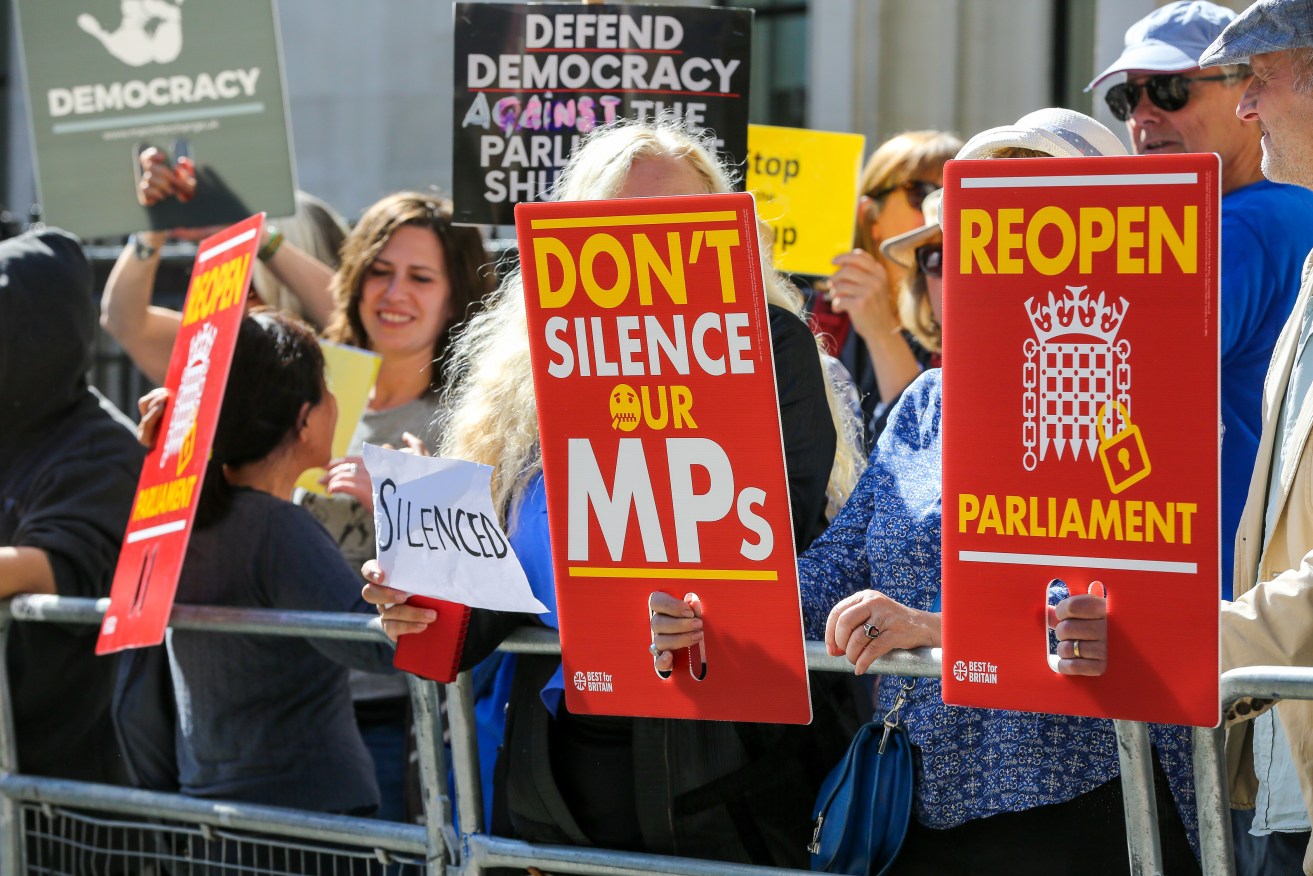Boris could be forced to recall Parliament over Brexit mess
Boris Johnson could recall parliament if Britain’s highest court rules he unlawfully suspended it, a government lawyer says, after judges heard the prime minister wanted a shutdown because it was an obstacle to his Brexit plans.

Protesters outside the UK Supreme Court hearing an appeal over the shutdown of Parliament. Photo: Steve Taylor/SOPA Images
Johnson announced on August 28 that he had asked the Queen to prorogue, or suspend, parliament for five weeks from last week until October 14.
He said the shutdown was necessary to allow him to introduce a new legislative agenda.
Opponents say the real reason was to prevent scrutiny and challenges by parliament – where he now has no majority – to his Brexit policy, especially his promise to leave the European Union by October 31 even if no divorce deal has been agreed.
They want the Supreme Court, the United Kingdom’s highest judicial body, to rule Johnson’s actions were illegal.
Critics, including rebels thrown out of his Conservative Party over Brexit, say he should resign if that is its decision.
“The consequence (of his advice to the monarch being ruled unlawful) could be that he goes to the Queen and seeks the recall of parliament,” Richard Keen, the government’s chief law officer in Scotland, told the court.
However, Keen was unable to rule out that Johnson might then look to suspend parliament again.
In a damning judgment last Wednesday, Scotland’s highest court said the suspension was unlawful and an “egregious” attempt to stymie parliament.
However, a week earlier the High Court of England and Wales rejected a similar case, saying the matter was political and not something judges should interfere in.
All 11 judges on the Supreme Court will now decide on a crucial question: how far Britain’s unwritten constitution limits the power of the prime minister and whether Johnson’s advice to the Queen was therefore illegal.
“That this is a serious and difficult question of law is amply demonstrated by the fact that three senior judges in Scotland have reached a different conclusion from three senior judges in England and Wales,” said Brenda Hale, president of the Supreme Court.
Launching the legal challenge to Johnson’s decision, a mixture of anti-Brexit campaigners and opposition MPs, David Pannick said there was strong evidence the prime minister wanted to silence parliament because he saw it as an obstacle.
No premier had abused the prorogation power in this way for at least 50 years, Pannick told the court.
He said it was “remarkable” Johnson had not provided a witness statement spelling out his reasons for the prorogation and that the court could draw adverse inference from that.
Johnson has said the current session of parliament was longer than any since the English Civil war in the 17th century, and that MPs would have plenty of time to discuss Brexit again after an EU summit on October 17-18.
In an interview broadcast on Tuesday, Johnson declined to say whether he would recall parliament if the ruling goes against him.
“I think the best thing that I can do is wait and see what the judges say,” he told the BBC.
However, Keen said the prime minister would “respond by all necessary means” to any declaration by the court that the advice Johnson gave to the Queen was illegal.
But asked by one judge if Johnson might seek another suspension, he said: “I’m not in a position to comment on that.”
He argued that only seven working days would be lost through the suspension, not five weeks, because parliament would be on holiday in late September as parties held annual conferences.
The government says opponents of Brexit are using the courts to try to frustrate Britain’s departure from the bloc which was approved in a 2016 referendum.
But Pannick said the aim was to establish that parliament was supreme in British law and not the government.
-AAP
Want to comment?
Send us an email, making it clear which story you’re commenting on and including your full name (required for publication) and phone number (only for verification purposes). Please put “Reader views” in the subject.
We’ll publish the best comments in a regular “Reader Views” post. Your comments can be brief, or we can accept up to 350 words, or thereabouts.
InDaily has changed the way we receive comments. Go here for an explanation.




